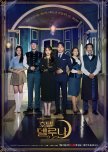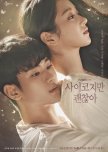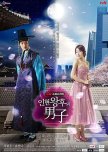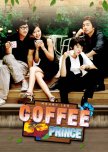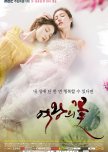
this had me hooked!
In all honesty, there ain't much to say here. It was a pleasant watch. The story was intriguinc and well paced. That being said I don't exactly see myself coming back to it and rewatching. Still, the actors did a great job and I am glad to have watched it!................................................................................................................................................................................................................................................
Was this review helpful to you?

Four unconventional wholes, being clumsily vulnerable with each other
Two sisters, identical from head to toe, leading completely opposite lives.My only critique of this drama is that I wish it was longer, giving more time to explore certain things in just a little more depth.
I find it interesting how two people of the same age, who look and sound the same, grew up under the same roof, surrounded by the same people, how they can turn out so different from each other, and walk such different paths in life. It’s fascinating to think about.
A big thing with this drama is that there are no real villains, rotten to the core. I didn’t hate or even really dislike any of the characters. Everyone made mistakes, someone could do or say something I disliked, but they were all human. No one means to be cruel, and when they realise that, they try to do better. Isn’t that what we all strive for, to be better It’s just that often we don’t know how, and we lack the courage to ask for help, or are unable to find the words.
Favourite quotes:
The first twin would be Mi-Ji, meaning unknown. The second would be Mi-rae, meaning future. But the first one needed a future more than her sister. So the older sister was named Mi-rae. As for me, I just got the name that was left.
Was this thrown away because it deflated? Or did it deflate because it was thrown away? Am I living like this because of the way I am? Or am I like this because of the way I live?
Nothing happened but so much has happened all
these years to even process it. To have only lived
in my mind and nowhere else but only the idea of the world.
I am not who I used to be and I am not who I want to become I am just stuck.
What makes a person human
Is love, pressed down just a little
Pressed a little
From above, below, and the sides
Like freshly packed rice in a bowl
Like an eraser worn down
From choosing kind words
So that the warmth shared
Between two embraced bodies
Won’t escape
Won’t disappear
And will become human
Was this review helpful to you?
I felt seen.
As someone who went through self-isolation, self-pity and self-hatred multiple times (and unfortunately will keep going through this vicious cycle at least once a year) this drama and the writing made me feel seen and undersood.For someone who hates themselves as much as we do, things like criticizing what we're doing (or not doing), asking us about our plans for future, telling us to just change the way we see the world and other things like that doesn't help at all. and believe me when i say this: no one is harsher on us than we are.
Actually getting yelled at and being called useless is comfortable for us since we are trying to punish ourselves anyways. It's familiar because we tell ourselves the exact same things whenever we are alone with our thoughts, and it's a lot easier than having to face our problems and our selves.
The attention and worry of our loved ones (if we are lucky enough to have people who care about us) becomes a burden and an additional source of stress and anxiety, which we try to avoid as we already have too much on our plate. Hence the isolation.
The invisible barriers that we face, sometimes as simple as getting out of bed yet so difficult to achieve, are not considered real or acknowledged. It's " just all in our heads". Well I guess that statement isn't wrong.
I was lucky enough to be able to go back to a somewhat normal, functional life and I am so grateful for that. And don't get me wrong, I'm fully aware that this ... well ... situation ... is in fact an excuse for me that helps me avoid the effort it takes to change myself for the better and face the problems in my life. But it doesn't make it any easier to overcome.
What helped me was in fact one friend. Just one friend who undertood what I was going through because she was going through the same thing. What I felt watching this drama, specially when we see what Mi-Jae went through in her room, gave me the familiar feeling of when i was venting to that one friend. This is why this drama is special for me.
The acting is great. The whole cast did a great job, specially the main leads. However in my opinion Kim Sun-Young who played the role of male lead's mother is the actress who shines the brightest. Her performance in episode 11 is unforgettable and truly great. I hope all the best for her.
I do want to mention this was not a comfortable or easy watch for me. I tend to start dramas after they are finished, but I still had to go back and forth between this drama and other, more lighthearted dramas.
Thanks for reading this long review.
If you are going through the same problems I did, feel free to hit me up. I do not have a solution, but maybe I can help you the way my friend helped me. I am here if you just open that door.
Was this review helpful to you?
A gentle, comforting balm of a show for the woes faced by today's youth
If a show could be perfect, this would be it.Our Unwritten Seoul tells the story of twins Mirae and Miji, primarily from the perspective of the latter. With a name meaning future, Mirae is set up for success, with a public corporation job in the heart of bustling Seoul. Miji, on the other hand, lags behind, having been set back by a track accident in high school and the ensuing frustration of losing her one talent. Despite being in seemingly opposite places in life, Mirae harbors a deep loneliness due to circumstances at work, while Miji keeps her spirits up despite working odd part-time jobs. When the two get involved in each others' lives, they get insight into the unique problems each one faces, while growing, healing, & learning what they truly want out of life.
As a 20-something year old trying to find my footing in the big, bad world, I really felt heard by this show. I related to Miji's frustration when things kept not working out, her burnout and resentment of the situation she was placed in. I related to neighbor Lee Hosu's struggle between his morals & career ideals. I related to the complicated relationship between a mother and daughter whose relationship mirrors the relationship of the mother and her own mom. I related to Mirae's overwhelmed feelings in a huge corporation, where you feel like a cog in a wheel. I related to Miji's inability to escape the throes of her own mind, Mirae's enthusiasm hidden by a cold cynicism. So many dialogues felt ripped from my mind, like they watched me during my lowest & highest points and turned my thoughts into a show. And I know I'm not the only one - so many of my friends have echoed the concerns these characters have. In being a slice of life story with a guiding plot thread, they cover so much ground, all while feeling so natural. It's like entering their world for a brief moment, and exiting when the time is right.
But even if you aren't young and entering the real world for the first time, this show is still immensely enjoyable. You'll find highlights in the bristly Rosa restaurant shop owner with deep scars and a sad past. Her journey to healing and growth, as she opens up to Miji, is so touching to see. Her backstory was simply brilliant. Hosu's mother and Hosu have such a fragile but lovely relationship, which was explored so beautifully. The strawberry farm owner and his love for his grandpa add such a warm note to the drama - he reminds us of optimism & hope when the other characters lack it. The morally gray lawyer, using his diability as a shield, was so interesting, not painted as wholly good or bad in a very fresh way. And the lovely grandma, God bless her heart, brought so much humanity to a story about women and their struggles. Every conversation, every relationship, every scene, every little detail felt intentional, built to mirror another or remind a character of some good in the world.
Naturally, this only happens when your actors blast it out of the water. Boyoung is a force in this, as Miji and Mirae almost always feel like two completely distinct people. She portrays Mirae's quiet sentimentality and Miji's exuberant happiness so faithfully, you ncompletely forget that they're the same actor. She has perfect chemistry with both her male costars, a difference in the way each character looks at their specific love interest. I really think Jinyoung picks his roles so well; they feel human & emotional in the best way. You could see the conflict in his eyes, but also a real and deep love. Mr. Strawberry farm, the mom, the Rosa restaurant owner - all given 10000% justice by their actors, which is so important for everything to weave together so effortlessly.
Despite its darker subject matter, the show never feels depressing. Its real in that the sadness parallels the happy moments. It ebbs and flows naturally. And it all works to tell the story of these Normal People. Its the story of people like you and me and how we maneuver the everyday struggles of life. It was short, it was sweet, it was intentional. And that is why I consider it a perfect drama. Despite wanting more of some things (like the strawberry farm couple!). I recognized that it wrapped up perfectly. It reminds us that pains do pass and that, one day, we'll look back on hardships and smile, because we have grown so beautifully and come to our own, no matter how long it takes. And I'll be waiting for that day.
Was this review helpful to you?
I love the vibes of this drama:3
I actually thought of dropping this when I was at 4th episode. But instead of doing that I continued watching it because I wanted to see how Mi-ji’s life would turn out, she was the character I liked the most(: And I did not regret finishing this drama at all. The first few episodes might be boring for me but it just kept getting better. After a few episodes, you could observe many character developments. I liked Ho-su’s character development the best! Not to mention Mi-ji and Ho-su’s moms! They both had distinctive upbringings which was interesting! And also, Park bo young and Jinyoung’s acting was a french kiss(; They acted the characters so well!Was this review helpful to you?

Our Unwritten Seoul: Tears, Triumphs, and Everything in Between
Let me be honest here: my primary reason to watch Our Unwritten Seoul was Park Bo-young. Her dual performance as twin sisters Yu Mi-rae and Yu Mi-ji wasn’t acting, it was borderline sorcery.Her portrayal of Yu Mi-rae and Yu Mi-ji was nothing short of spellbinding. Park Bo-young didn’t simply “differentiate” the sisters, she inhabited them so completely that I often forgot it was the same actress pulling a double duty. It wasn’t just about different hairstyles or wardrobes. It was in the bones of the performance: body language, pacing of speech, vocal pitch, rhythm of breathing. Even her eyes supported the distinction, Mi-ji’s gaze would lock onto you with unwavering boldness, her pupils contracting as if she could pin you to the wall with confidence alone. Meanwhile, Mi-rae’s softer presence lived in subtler shifts of eye contact, in those small, almost imperceptible glances that spoke of someone cautious yet endlessly tender.
It’s rare that you can watch a drama and believe, even for a split second, that an actor has conjured another version of themselves into existence. But Park Bo-young did that to me here. The illusion was seamless not because of clever camera trickery, but because she responded to her “other self” with such organic timing and emotional reciprocity that it felt like both sisters were alive in the same frame. She wasn’t just hitting marks on a green screen, she was listening, reacting, breathing with her own double.
And here’s the thing: my favorite moments in the entire drama weren’t the big melodramatic crescendos or the jaw-dropping reveals. They were the quiet ones, the scenes where Mi-rae and Mi-ji sat across from each other, twin to twin, sister to sister, and just… talked. That’s where the spell truly took hold. Those conversations didn’t just look technically seamless (though they absolutely were); they carried a raw, unfiltered intimacy that made the drama pulse with life. You could feel every ounce of unspoken pain, shared memory, and stubborn love crystallize in those exchanges. It wasn’t Park Bo-young against a green screen anymore. It was two sisters, fully present, breathing the same air.
What makes this sorcery so mesmerizing is that Park Bo-young wasn’t only flipping between characters. She was actively building chemistry with herself. Every tilt of the head, every softened gaze, every flicker of body language was not only in character but also in response to her other performance. She didn’t just double herself; she gave each twin the ability to react, clash, and love in ways that felt utterly real. It’s the kind of alchemy that turns acting into something higher: not performance, but presence. She conjured a sisterhood bond out of thin air and then convinced us it had been there all along.
And while Park Bo-young rightfully commands the spotlight, I’d be doing a disservice if I didn’t tip my metaphorical hat to Lee Jae-in, who played the twins in their teenage years. At just twenty-one, she’s already building a respectable filmography, and you can see every ounce of that experience at work here. Playing one character convincingly is already a high bar, but switching seamlessly between two, and making sure they align with Bo-young’s adult versions, is the sort of acting tightrope that could break a drama if mishandled.
If Park Bo-young was the magician casting spells, Park Jin-young was the grounding force that made every illusion believable. He stepped into Lee Ho-su with his signature calm melancholy, the same quiet intensity many might remember from The Witch. But here, that stillness became something more layered: a man who has been quietly fighting himself since high school, carrying an invisible weight he can’t seem to set down.
What made Jin-young’s performance even more mesmerizing was how much it depended on who Park Bo-young was being in the moment. He had to recalibrate constantly: his Ho-su was tender and supportive, and vulnerable around Mi-ji, but guarded, direct, and restrained around Mi-rae. Watching him adjust his energy depending on which “sister” he thought he was speaking to was an acting masterclass in itself. Their chemistry didn’t just flicker on like a switch; it bent and reshaped itself depending on identity, tone, and circumstance. That’s rare in Kdrama land, where we’ve all seen leads struggle just to make one dynamic believable. Jin-young and Bo-young made two entirely distinct relationships feel alive and breathing.
Here comes my favourite part, plot analysis. The central narrative was a rich exploration of siblinghood, identity, and emotional survival. Mi-ji, bubbly yet insecure, constantly craved recognition beyond being “Mi-rae’s sister.” Her depression arc was heart-wrenching but believable, her forced brightness a shield against relapse. Mi-rae, frail but driven, lived shackled by the weight of self-imposed responsibility – her strongest skill, as she admitted, was “enduring hardship.” The dichotomy of their coping mechanisms was fascinating and devastating to watch.
Mi-ji, the brighter twin, radiates warmth and humor, but it’s a carefully chosen brightness. She isn’t naïve, her cheerfulness is a shield she wields against relapse into the depression she once fought. Every joke, every smile feels like an act of resistance, a refusal to sink again. She survives by creating light, even if it burns her at times.
There’s something quietly heroic about the way Mi-ji navigates life. She is laughter in a room that threatens to collapse under its own silence. She is the friend who cracks a joke when tears are about to spill, not because she can’t handle pain, but because she knows too well what it feels like to drown in it. Her brightness is not denial. it’s defiance. Park Bo-young plays her with that razor-thin balance of someone who is both deeply wounded and fiercely protective of her own healing. Watching her feels like watching sunlight that refuses to dim, even when clouds roll in.
If Mi-ji’s light is born of resistance, Mi-rae’s quiet is born of endurance. With her frail health, Mi-rae learned early on that conserving energy, physically and emotionally, was her safest path. To outsiders, her cold detachment looks like aloofness, but the truth, which everyone around her quietly knows, is that she’s simply hiding her vulnerability behind silence. She carries her emotions inward, pressing them so deep that only Mi-ji, her twin, has ever been allowed to see the unfiltered version of her.
It’s heartbreaking, because her strength is also her cage. Endurance keeps her alive, but it also isolates her, creating a quiet fortress where no one is allowed in. She is always seen but rarely understood, always present but rarely known, except by Mi-ji, who has been both her witness and her refuge. Mi-rae’s stillness becomes a shield, a way to keep pain from spilling out, but it also robs her of the ability to fully live. And yet, Mi-ji isn’t free either, her weapon of choice is forced cheer, the constant laughter and lightness she uses to keep despair from seeping back in. Together, they embody two sides of the same coin: one who refuses to feel in order to survive, and one who overflows with feeling to prove she’s still surviving. It’s a duality that reveals not just their love as sisters, but the ways we all invent fragile methods to keep our own shadows at bay.
As brilliant as the twins were at carrying the emotional heart of Our Unwritten Seoul, it would be a crime to ignore the role the supporting cast played in making this world breathe. A good drama can live off the strength of its leads, sure, but a great drama wraps those leads in a community of characters who feel lived-in, messy, flawed, and deeply human. This drama does exactly that.
Let’s start with Kim Sun-young, because, really, where else could I begin? She plays Yeom Beon-hong, Ho-su’s mother, with such devastating precision that you almost forget you’re watching an actor. There’s a reason she’s been dubbed one of the “S-tier mothers of Kdramaland”, she has this uncanny ability to pull a thread of familial pain and make it unravel right in front of you. Her confrontation scene with Ho-su in episode 11 was nothing short of lethal. No screaming dramatics, no manipulative background swell, just raw, grounded truth between a mother and son who no longer know how to stand on the same side of the line. Kim Sun-young doesn’t just act; she inhabits. Every sigh, every flicker of pain across her face, every pause before she speaks lands with a gravity that forces you to sit in that uncomfortable, heartbreaking space. It’s the kind of scene that doesn’t just move the story forward, it rearranges you emotionally as a viewer.
Jang Young-nam as Kim Ok-hee, the twins’ mother, was another standout, not because she was warm or nurturing, but because she embodied a kind of broken honesty that most dramas shy away from. One of the most gutting scenes comes when she finally admits, with the gentle push of Ho-su’s mother, that she never felt worthy of love from her own mother (the twin’s grandmother), and because of that, she’s never known how to be a mother herself. It was a revelation that cut deep, especially when she confessed that she couldn’t even tell her own twins apart when they were young. Watching her break under the weight of that inadequacy was painful, but what made it truly unforgettable was the way Ho-su’s mother quietly reminded her that perhaps the first step to being loved is learning how to love. It wasn’t some grand, melodramatic revelation, it was two old high school friends, both mothers, sitting in their raw truth about how impossibly hard it can be to raise children while carrying your own scars. That scene didn’t just add depth to her character; it reframed the whole intergenerational trauma of the drama in one intimate, heartbreaking exchange.
Cha Mi-kyung as Kang Wol-soon, the twins’ grandmother, provides the counterbalance to all that generational fracture while hiding her own trauma. She’s the anchor, the tether that kept Mi-ji from fully breaking apart during her darkest moments. In lesser hands, the grandmother role might’ve been just the “wise elder with warm soup and tired proverbs.” But Cha Mi-kyung imbues her with such resilience and grounded strength that she feels less like a stock figure and more like the last bastion of love in a family scarred by absence. She’s flawed, yes, but her presence is steady, and you can feel how desperately Mi-ji clings to that steadiness. The way Cha Mi-kyung delivers even the simplest lines, softly but firmly, wraps around the viewer like a blanket stitched out of both tenderness and grief.
If Our Unwritten Seoul has one glaring flaw, it’s how it mishandled episode 11. Up until that point, the drama had been a masterclass in pacing its emotional blows – every scene landed like a surgical strike, clean, precise, and devastating when it needed to be. But then came the decision to escalate Ho-su’s trauma with his mother so close to the end. And that, for me, was where the whole thing buckled.
Here’s my problem with dropping fresh trauma at episode 11 of a 12-episode run: I’m already spent. The earlier episodes had been so good at threading quiet devastation and tenderness that by the time this “new big emotional reveal” came along, I wasn’t shocked or gutted, I was numb. Not because I didn’t care about Ho-su. Not because the acting was lacking (it was excellent). But because the drama had already overdrawn my emotional account so early in the story. That moment was like the writer handing me one more glass of whiskey after I’d already blacked out at the table. I couldn’t register it. My system had shut down.
It’s not that the subject matter wasn’t moving, it’s that the drama didn’t leave space for it to land. A truly healing drama like this needed its final act to feel like a decrescendo, not another crescendo. The earlier episodes had already wrung us dry with cathartic sadness, grief, and flashes of warmth. By episode 11, what I needed was a gentle descent, a slow unwinding of threads, a soft reminder that even after pain, people find ways to live. Instead, I got a sharp spike, a wrenching escalation that broke the rhythm.
The result? The finale felt uneven. Instead of holding me in its arms all the way to the last note, the show left me watching from behind an emotional glass wall, unmoved where I should have been undone. And that’s the tragedy, because Our Unwritten Seoul was strong enough that it didn’t need that extra push. It could have let me go with warmth, not exhaustion.
The second flaw? Han Se-jin. Was he really necessary?
The problem wasn’t the character design. On paper, Han Se-jin’s goofy, soft-edged charm is exactly the kind of energy that could’ve thawed Mi-rae’s ice. The issue was Ryu Kyung-soo’s casting. He simply couldn’t inhabit that playfulness convincingly within Unwritten Seoul’s carefully muted register. His performance felt forced, like he was reaching for “quirky and lovable” but landing on “awkwardly out of place.” It’s the kind of tonal dissonance that pulls you out of the story rather than weaving you deeper into it. Imagine casting Jet Li to play Mulan, not because Jet Li isn’t immensely talented, but because no matter how hard he tries, the role just doesn’t sit in his wheelhouse. That’s how Se-jin’s scenes felt: mismatched, misaligned, and tonally disruptive. Next to Jin-young’s Ho-su, who delivered restrained nuance at every turn, Se-jin felt like an intrusion.
This left me asking the bigger question: did Mi-rae even need a love interest at all? My answer, bluntly, is no. Her arc wasn’t one that required romance to feel complete. Mi-rae’s journey was about survival, healing, and slowly re-learning how to open her heart to family and to life itself. By forcing a half-baked romance subplot, the writers not only wasted precious screen time, they also cheapened her growth. What could have been a story of a woman reclaiming herself and her agencies became cluttered by an unnecessary distraction.
In the end, Se-jin didn’t balance Mi-rae. He blurred her, he diluted her. And that, more than anything, felt like a betrayal of what Mi-rae deserved.
At its best, Our Unwritten Seoul was a devastatingly beautiful exploration of love, family, identity, and the quiet wars we wage with ourselves. For the first 10 episodes, it soared, driven by Park Bo-young’s once-in-a-generation performance and supported by stellar writing, OST, and side characters. It could’ve been my third ever Perfect 10 drama. Instead, a late-game stumble knocked it down a peg.
But twelve episodes is a tight canvas, and the last-minute stumble -miscasting, tonal misalignment, and pacing that faltered just when it needed discipline – dragged the finish line out of reach. Instead of perfection, we got brilliance with an asterisk.
Still, don’t let that stop you. This is a must-watch. Not just because Park Bo-young performs like a woman possessed, but because beneath the fumble lies one of the most poignant explorations of love, family, and identity I’ve seen in years. It’s an emotional gauntlet, yes, but also a rewarding story about endurance, healing, and the complicated bonds of family
Was this review helpful to you?

This review may contain spoilers
Flips the stereotype of identical twin closeness; healing family drama
Review9.5/10 is my rating.
Our Unwritten Soul is a deeply emotional drama that blends romance, family struggles, and the complexities of identity with identical twin sisters at its center. The acting is phenomenal—especially from the actress playing both female leads, Mi-hi and Mi-rae. She captured each sister so convincingly that I never once lost track of who was who.
Mi-hi stood out as a character I really loved. She was kindhearted, thoughtful toward her family and friends, and always trying to support others even when she was hurting. Her warmth made it even harder to watch how her mother constantly criticized her and compared her unfavorably to Mi-rae.
The story tackles family expectations, sibling rivalry, and the ways love can both heal and complicate relationships. At times, it’s heavy and heartbreaking, but it’s never dull. Even the side characters—like the adopted mother whose fierce love for her son was one of the most touching parts of the drama—felt layered and real.
This is a romance at its core, but also a family-centered story that explores how we see ourselves and how others define us. It isn’t a light watch, but it’s beautifully done and meaningful. If you enjoy stories about complicated families, strong character growth, and romance that develops under unique circumstances, Our Unwritten Soul is worth your time.
Spoilers
Mi-rae, though compelling, often came across as selfish. She had Mi-hi take her place at work even though she knew it meant sending her into a hostile environment with bullies and even a sexual harassment situation. Mi-hi wasn’t warned and was told only to “sit quietly,” avoid the male lead, and keep secrets—while Mi-rae, when pretending to be her sister, behaved however she wanted. She ignored their grandmother at first, treated Mi-hi’s best friend who was her ex-boyfriend coldly, and worked the farm with little concern for how her choices would affect Mi-hi’s reputation. It felt unfair and very one-sided.
The relationship between the adopted mother and her son was another emotional highlight. Their eventual heart-to-heart about his guilt—believing he couldn’t call her his true mother—was powerful. I only wish he had told her sooner what he overheard his relatives saying about him being a burden. That moment could have added even more emotional depth.
Some story choices frustrated me. For example, Mi-hi keeping her secret from her romantic interest for so long felt unnecessary; he was proven trustworthy and capable of keeping confidences, so the delay only created avoidable frustration. The grandmother’s death also felt like an oddly placed plot point—it was heartbreaking, but it didn’t meaningfully move the story forward.
As for the ending, it leaned too “soft” for my taste. Mi-hi’s decision to go to school to become a therapist was wonderful, but the delay in marriage felt like it was playing into a modern “independence before romance” trend rather than being true to the heart of the story. A proposal or engagement would have been a more satisfying romantic payoff. Similarly, Mi-rae and “strawberry guy” had clear chemistry when he returned, but the lack of even a confession felt like a missed opportunity.
On the positive side, I appreciated how both sisters grew from the experience and came to understand themselves and each other better. By the end, their relationship was warmer and healthier, and it felt like the beginning of true healing from a mother who had always struggled to show love.
The two single mothers’ friendship—so different in background yet united in strength—was inspiring, and Rosa the poet’s arc was fascinating and uplifting in the end.
Overall, Our Unwritten Soul is a powerful drama with stellar performances and heartfelt themes. I recommend it highly, though it’s not a light or endlessly rewatchable story. It’s heavy at times, but if you stick with it, it rewards you with meaning, emotion, and a memorable exploration of love, family, and identity
Synopsis
This is a 2025 South Korean family drama with 12, 70 minute episodes.
Identical twin sisters Yoo Mi-ji (Park Bo-young) and Yoo Mi-rae (Park Bo-young), have covered for each other their whole lives. When one twin is better at something than the other they tag switch and few people can tell they swapped places. So, when Mi-rae is considering self harm as a result of extreme stress and workplace bullying, her twin Mi-ji determines it is time to switch. While identical in looks the two have always had very different personalities. Mi-ji, is an extroverted free-spirit who cared more about track and field than academics. But, an injury kept her from going on to achieve any greatness in athletics and she is currently living back at home and taking on multiple part-time jobs and piece work. She has remained in their home town of Duson-ri while her introverted by high academic performing twin has moved to Seoul to pursue a career. Mi-rae is stuck in a job that is draining her spirit but has to keep working as the family needs her career income. So, she accepts Mi-ji's offer to switch to give Mi-rae a break from the dog eat dog existence of the salary person. The twins had drifted apart so neither was fully aware of what the other's life was like. Stepping into each other's roles they begin to learn a lot of things they did not know about the other.
As Mi-ji navigates Seoul’s corporate maze and Mi-rae finds solace in the countryside, their ruse not only reveals the conditions of their current existence, but it also unearths things they were unaware of from the past. Mi-ji is joined by Lee Ho-soo (Park Jin-young), a charismatic lawyer with a concealed wound who was her first love her broke her heart. And Mi-rae becomes a business partner with Han Se-jin (Ryu Kyung-soo), a thoughtful strawberry farmer. This is the journey through the heart and minds of two sisters who, by playing the other, learn more about themselves and what happened to their once tight shared twin bond. As they figure a better way forward they discover a way to chart a future that leads to true happiness. the sisters confront love, identity, and the courage to rewrite their futures in a poignant tale of healing and self-discovery.
#OurUnwrittenSeoul
Was this review helpful to you?

It's like living a real life in a drama with very broken people.
I was reluctant to watch this drama for two reasons: The high rating here and the numerous average/below average reviews here (a very big contrast, i was like why?)Anyhow, I gave in and i'm glad I did. As someone who loves romantic dramas, this drama gave me butterflies in my stomach.
I thought maybe they wrote this drama based on real people, and the story was not exactly a story but a narration of real people and real events. I felt like i lived with the cast while watching. I felt their pain, their sorrows, their longing. it was just beautiful.
Story:
Set in the countryside, the story revolves around identical twin girls and a boy named Ho-Su. They all had hard upbringings with heavy baggage in their adulthood. There are lots of trauma-related and depression issues introduced too. The characters are all broken, which made this drama very realistic. Romance is not the major plot of this story but the development of the twins and their love lives is beautifully depicted.
Writing:
I initially thought this is based on real-life people or a novel, but whoever wrote this drama interestingly made it appealing and heartfelt. unless one is so lucky in life to have an easy life, we all suffer in different areas, and sometimes it's soothing to see how healing happens in a world full of chaos. The only issue with the writing was miscommunication. albeit minor, this could have been developed better.
OST:
As a sucker for bgm tracks in Korean dramas, this one had a marvelous choice of OSTs. The songs are all beautiful and memorable. The pieces sometimes gave me goosebumps as they matched the mood perfectly.
Acting:
PBY never disappoints. i haven't been a fan of hers and only watched a few of her dramas, but delivering the twins' characters and emotions was hard, and she did amazing.
PJY, well, he delivered a green forest guy who smiled with his eyes. I loved how gentle and kind his character was and he wasn't afraid to show his vulnerability. Kudos to both!
Romance is very important to me and this drama's romance was more like a subplot, but it felt like it was there from the beginning. The first-love trope existed from the first episode and the adult Miji-Hosu's relationship and chemistry was amazingly beautiful. wish they had more initmate/kiss scenes though lol.
Overall, a beautiful drama. i'm glad the negative reviews and the super high rating didn't sway me.
Was this review helpful to you?
Worth watching
i was sceptical about watching a melo drama but it turned out to be interesting. although its a bit on the slower side but thats what brings the genuinity. on top of it all amazing cast and acting.The storyline of mirae and strawberry farm owner, unexpectedly was very amusing and the chemistry was great, i wish they would do another drama with more romantic storyline.
Was this review helpful to you?
This review may contain spoilers
Our unwitten Seoul
Park Bo Young is in it so there was no way no to watch it.This is rather calm drama, daily type, pretty simple plot but at the same shows perfectly how people can suffer. Eventhougth episodes were pretty long it was so easy to watch.
PBY is amazing here, maybe it is not something totally out of her range - I need to see her playing a villain, but she perfectly shows harder emotions and it was amazing cause she perfectly potrayed two different characters - I am amazed. Her mother was sometimes annoying but at the same time she wanted to be good mother, Grandma was the best! Also PBY's chemistry with everyone was soo good:
- Park Jin Young - so cute, they were really adorable, he gone trough so much and still was so lovely, also his mother is an angel
- Ryu Kyung Soo - OMG why they did not kiss?! they were my fav duo and I wished we got more with them, he was so funny and at the same time adorable and goofy, love him
- Moon Dong Hyeok - yes I know they played friends but they still had great chemistry and I can totally see them playing as couple in other drama
All guys above played great, I love their different personalities, all green flags.
Also I just cannot mentioned her - restaurant owner - love her story.
In general I try to talk more about actors than plot, simply because I do not want to spoil something by acciddent - so story is good, calm, perfect when you need to relax, acting amazing, long episodes (if you prefer short then you can have a little hard time but really worth checking). Yes, just amazing drama.
Was this review helpful to you?

This review may contain spoilers
this felt like a warm hug.
it's been a while since i felt so infatuated by a kdrama series. not only is this casting insanely perfect, none of the storylines felt like filler, even when they were completely separate & individualistic. this drama handles grief, growth & familial bonds with the utmost care and will have you sobbing throughout multiple points while watching.casting park jinyoung & kim sunyoung as mother & son has got to be the best casting decision i've seen in korean dramas in a hot second...two genius actors that delivered an insane performance together. all of these characters feel so alive and park boyoung NAILED her dual role in this. the ending is so satisfying & well-done.
i applaud the writers. bravoooo :3
Was this review helpful to you?
Nothing bad nor good
a drama that you can do with or without, but you can still watch it - its a slow paced drama and you can find warmth in it here and there. and as always, park bo young acting is great.P/S. i can't tell if mi rae and se jin is romantically involved or not...feel like they are, but doesn't feel like it at the same time. is it just me confused..?
Was this review helpful to you?











